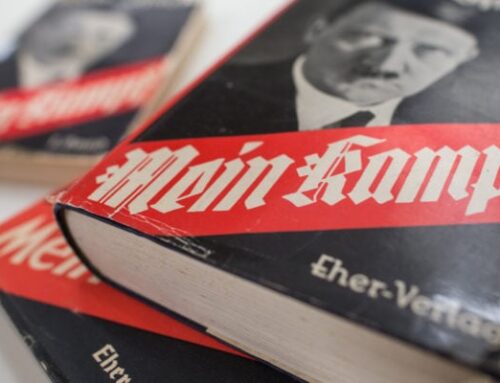There are two articles here. This is a very dangerous time for the world. These are the last of the last days. If you do not sense this within then odds are you are so otherwise occupied, so hiding and denying the realities of this fallen world hurtling towards its eternal demise as it has been. So self-absorbed, so fearful, so lost, so dead within the darkness within that all sense and truth is absent.
Living as such only perpetuates and exacerbates the sick, lost condition of this world and the overwhelming majority of its people. Were this not so the world would be an utterly, totally different place.
If a disciple of the Lord Jesus Christ, a true child of God, one of His people rather than a child of disobedience and this world while the uncertainty, confusion, lies, and misinformation constantly pouring in from every direction may allow fear and worry to creep in — there is no reason to fear or worry.
Not if one of the Lord’s.
Which He will never lose.
No matter what happens.
Do not fear or worry.
Definitely do not hide, be idle, lazy, or so otherwise occupied in worldly activities as to attempt to push down, push away the realities of this fallen and sin-filled world.
Now is the time to become more Bible literate, more Bible fluent, more Bible aware. The whole of the whole inerrant infallible living Word of God.
Now is the time to strengthen one’s faith and spend more time growing in faith and a true relationship with God, with Jesus Christ, and with the Holy Spirit.
Every word within the Word of God is true. Times are not going to get better. People are not inherently good. There is almost nothing but lies coming from the tongues of world leaders, politicians, corporations, those that claim to know yet remove, omit, and deny God, remove, omit and deny the Lord Jesus Christ, remove, omit, and deny the Holy Spirit, remove, omit, and deny the Holy Bible — or use those at times of convenience, in vain, for personal approval and gain.
Be always ever diligent. Even if it becomes tiresome.
Be in the Word of God. Daily. Nightly.
Be in prayer. Not amiss. Pray for leaders to find Divine godly wisdom even if they are among the darkest, most vile of those among us. Do not limit or deny the power of God. The authority of God.
Pray for peace.
Prepare for war.
Prepare your individual spirit and soul for eternity.
While being blessed with life each day.
Turn to the Lord and His Word and not the things of this world.
Not now. Not at this time. These times.
Read on…
Ken Pullen, Wednesday, January 31st, 2024
A third world war would transform global finance beyond recognition
Wednesday, January 31st, 2024
By Jeremy Warner
Reprinted from The Telegraph
Given the risks, you might expect the ever-more apocalyptic warnings of World War Three, now almost daily trotted out by the politicians and the military, to be more obviously reflected in the behaviour of financial markets.
Even comparatively localised wars tend to be deeply damaging to the economies involved, though there are exceptions which I’ll come to.
But world wars are on another scale entirely – hugely destructive events which take decades to recover from. If fought in the modern age, with its lethal nuclear arsenals, it might even prove existential.
Yet markets appear entirely blind to any such threat. A deep insouciance hangs over their every uptick. Donald Trump’s warnings of World War Three are dismissed as little more than cynical electioneering; growing geopolitical instability is all Joe Biden’s fault and the only salvation is me, he keeps unconvincingly saying.
Similarly with the siren calls of the military for urgent increases in defence spending. What do you expect from armed forces starved close to death, with the so-called “peace dividend” diverted into burgeoning welfare budgets? They sense their moment, and are understandably going for it.
Whether the world is objectively any more dangerous today than it was two years ago when Vladimir Putin first invaded Ukraine is an interesting question. Markets plainly think not.
What Ukraine has demonstrated is that it is possible to have localised wars, even when they involve nuclear superpowers, without resorting to the mutually assured destruction of firing off a nuclear missile.
And be in no doubt that the West is in effect already at war with Russia. One of the reasons the UK military is demanding more defence spending is that so much weaponry has been diverted to the defence of Ukraine that it has left Britain short of even basic needs.
But if nuclear weapons have failed to act as a deterrent to military action by an insecure authoritarian regime, they probably have been reasonably effective in limiting the scale of the aggression.
Horrific though the consequences are for besieged Ukrainians, markets take comfort from the way events have played out. Putin is considered very unlikely to also take a tilt at the Nato-guaranteed Baltics, and despite the cost of living crisis, the wider economic impact has been smaller than feared.
Yet the politicians are taking no chances and almost everywhere rearmament has become a top priority. The trouble is that countries don’t tend to rearm unless they think there is at least some chance they might have to use those weapons. Nearly all wars begin with rearmament.
Adding further to the sense of global insecurity over the last week is the repudiation by North Korea’s Kim Jong Un of his peaceful reunification policy, a move which rightly or wrongly is seen as preparing the country for renewed war with the South and other regional “enemies”.
In any case, there is an almost total disconnect between market and political narratives when it comes to today’s mounting geopolitical tensions.
As far as I can tell, there is no attempt whatsoever by investors to discount what the politicians increasingly frame as a clear and present danger, even by way of what is known as “tail risk”.
Oil and gas prices have barely moved in response to the escalation of tensions in the Middle East, despite the region’s key position as a global producer.
This might seem faintly reassuring. If Mr Market thinks there is nothing to worry about, then perhaps there isn’t. Unfortunately, it doesn’t mean that markets are right.
Historically, investors have collectively tended to be particularly bad at predicting wars, if only because all wars are economically irrational, and it is therefore assumed that this will act as a natural deterrent to waging them.
In a highly influential book, The Great Illusion, published a few years before the outbreak of the First World War, the British journalist Norman Angell argued compellingly that the presiding age of global trade and international integration had made the economic costs of war so great that nobody could possibly hope to gain by starting one – the “great illusion” being that nations could still benefit from conquest.
Poor Mr Angell. He has been unfairly represented ever since as arguing that war had become impossible because economic interdependence was a “guarantor of good behaviour by one state to another”. In fact, his argument was only that trade made war less likely.
In the event, it made no difference at all, yet markets continued to believe in the logic of Angell’s argument even beyond the point of mobilisation. It wasn’t until borders started to close, sparking a chain reaction of defaults and a consequent collapse in the banking system, that investors fully appreciated the peril they were in.
Angell’s way of thinking nonetheless continues to instruct current analysis. For instance, Germany allowed itself to become dependent on Russian gas not just because it was cheap, plentiful and convenient, but because by economically embracing the Russian bear it hoped to tame it. Again, it made no difference.
Similarly with China, whose integration into the global economy has proved worthless as a guarantor of friendly relations. As tensions rise, Western economies are scrambling to disengage from complex international supply chains and make themselves more self-reliant.
Investors do admittedly wholly take on board the likely stagflationary consequences of this process of “de-risking”; it’s going to make goods and services more expensive and thereby crimp consumption.
Even so, markets don’t collectively seem to have thought through the wider implications. Why bother with self-sufficiency unless you think war, or at least some kind of effective blockade, might be coming down the line at you?
Few would ever welcome any war, but just occasionally military conflict does have positive economic consequences, despite the destruction it inevitably visits.
For instance, there is little doubt that, as an economy, the US benefitted significantly from the Second World War, finally ridding itself of the scourge of the Great Depression and establishing the country as the world’s dominant superpower and technological innovator.
Angell is therefore not entirely right to argue that nobody profits from war. The key difference here, however, is that the US was not the aggressor; its ascendancy was a byproduct of Japanese and German overreach.
It’s also true that all Western economies, including Germany, grew much richer on the rebirth that eventually occurred after the war had ended.
But try telling that to the afflicted during the mayhem of the immediate conflict, when the idea that in the long run everything will be fine again would be regarded as positively insulting.
There is of course a sense in which there is no point in worrying about possible but not yet baked-in events. In a third world war, all bets would be off the table, and finance would change beyond recognition. Any such catastrophe cannot be priced in.
The current complacency is nonetheless an oddity which seems to stand an ever-higher chance of breaking asunder on the rocks of harsh realities.
China linking with Russia, Iran and North Korea poses dangerous threat to U.S., former leaders warn
Political dysfunction at home emboldens adversaries, Pompeo and Panetta tell Hill panel.
Tuesday, January 30, 2024
By Bill Gertz
Reprinted from The Washington Times
The threat posed by COMMUNIST China and its anti-U.S. allies like Russia, Iran and North Korea is more dangerous today than ever, two former high-ranking administration leaders told Congress on Tuesday.
Former Secretary of State Mike Pompeo said China‘s Communist Party leaders are linking global crises in Ukraine, the Middle East and elsewhere as part of a comprehensive anti-U.S. strategy.
“It’s dangerous for the United States to allow the Chinese Communist Party to have engaged here at home in ways that undermine the very foundations of our republic,” Mr. Pompeo said in testimony to the House Select Committee on the Chinese Communist Party.
Appearing with Mr. Pompeo, former Defense Secretary Leon Panetta said China is exploiting global conflicts to promote a narrative of Western geopolitical decline.
“China has taken every opportunity to undermine the United States and the West, to make us ‘pay’ for access to their markets by stealing our intellectual property, to conduct economic espionage, and to try to keep us out of the Pacific,” said Mr. Panetta, a former Democratic congressman who served in the Clinton and Obama administrations.
Both Mr. Pompeo and Mr. Panetta also were CIA directors — Mr. Pompeo during the Trump administration and Mr. Panetta under President Obama.
China is building up its military capabilities and is increasingly willing to use economic coercion and the threat of force against Taiwan, Mr. Panetta said.
“We live in a dangerous world in which tyrants and autocrats and terrorists are challenging and attacking democracies,” he said. “And so they’re threatening our values. They’re threatening our interests and our national security.”
Mr. Panetta said he met Chinese President Xi Jinping when Mr. Xi was vice president and described the communist leader as “committed to an aggressive China.” China is growing more dangerous under Mr. Xi as he grapples with domestic economic problems, he said.
Building up American forces in the Pacific is an urgent task, he added, including additional U.S. military forces and defensive arms for Taiwan.
Mr. Pompeo said China is supporting friendly regimes in Russia, Iran and Venezuela economically through oil and gas purchases for its massive economy. North Korea also is closely aligned with Beijing.
“China, Russia, Iran, North Korea and Venezuela represent a new axis of evil regimes that is pushing a dangerous model for the world,” Mr. Pompeo said, “one where personal and religious freedoms are curtailed and controlled by the state, where neighbors can be invaded, coerced and abused, and economic colonialism is the norm.”
Deterring and defeating
China must be deterred and Chinese economic warfare against the United States must be defeated, Mr. Pompeo said. And the danger is not just in the Indo-Pacific region, but also closer to home inside the United States.
China “is inside the gates at our research labs, our government research institutions and our information space,” Mr. Pompeo said. “This cannot remain.”
Committee Chairman Mike Gallagher, Wisconsin Republican, noted that Mr. Xi and Russian President Vladimir Putin declared a “no limits” partnership days before Moscow sent troops to invade Ukraine in early 2022.
“What was once a smattering of rogue authoritarians causing trouble today looks a whole lot like an axis led by the Chinese Communist Party,” Mr. Gallagher said.
Criticizing the current Biden administration’s efforts to re-engage with Beijing in recent months, Mr. Pompeo said “some wonderful speech” or meetings in San Francisco and Beijing will not result in changes to China‘s anti-U.S. policies.
“We need to make sure that we hold [China] at risk in the same way that they seek to put America at risk each day,” Mr. Pompeo said.
Mr. Panetta said some are suggesting relations with China are improving through talks on the military and economics.
“But make no mistake, the only way to try to avoid war with China, the only way to deal with China is from strength,” Mr. Panetta said, adding that both China and Russia grew more aggressive after sensing “weakness on the part of the U.S.”
To counter that aggression, the United States needs to take strong action to arm and train Taiwan to better defend its interests and to build up U.S. forces in the region and invest in advanced military technologies, he said.
Divided at home
Mr. Pompeo noted in his prepared statement that political divisions within the U.S. are undermining Washington’s ability to counter the challenge from China.
“The question for us remains, to paraphrase what Abraham Lincoln stated so many years ago: Will we be the author of our own destruction?” he said.
Americans are at risk of destroying things that will deliver a victory over the Chinese leadership’s dark vision of global dominance, he said.
“Narratives, like the 1619 Project, tell sinister lies about the founding and fundamental character of our nation,” he said referring to a New York Times project that put systemic racism at the heart of the founding and development of the United States.
Mr. Pompeo, a former Republican House member from Kansas before joining the Trump administration, noted that difficult economic and social problems will not be solved by “simply printing more money and handing it out to privileged political groups.”
Fundamental cultural virtues of religious faith, decency and respect for vital institutions are being demeaned in the country, he said.
“The CCP’s model will not prevail. But a nation and society intent on despising and destroying itself will not prevail, either,” Mr. Pompeo said.
Mr. Panetta also said it is critical for Republicans and Democrats to work together, asserting that dysfunction in Washington threatens American security.
Mr. Xi “is very aware of what’s happening with regards to our country just as Putin is, and when they see dysfunction, when they see that we can’t get our act together to be able to do what’s right, then they sense that that’s weakness, and it gives them the incentive to think that given the opportunity they can take advantage of that,” Mr. Panetta said.
Mr. Pompeo argued that the Biden administration failed to deter Russian aggression in Ukraine and now must do more to prevent an attack on Taiwan.
“My effort as secretary of state was to remind the world that if we don’t hold [China] at risk, if we simply play defense, economically, defense diplomatically — if we allow a spy balloon to travel over our country for five days, and then hold a press conference announcing what brilliance it was to shoot it down over South Carolina — [then] Xi Jinping gets that he’s on offense, we’re on defense and that is not a good place for the United States to be.”
• Bill Gertz can be reached at bgertz@washingtontimes.com.








Leave a Reply, please --- thank you.